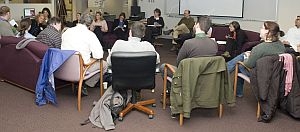
(Host) At a time when MBA candidates all over the country are downsizing their expectations, some students at Marlboro College are excited about theirs.
They’re enrolled in the college’s MBA in Managing for Sustainability. The program is another sign that more businesses are incorporating social and environmental concerns in their decision-making.
VPR’s Susan Keese paid the Brattleboro-based business program a visit, and files this report.
(Keese) The MBA candidates who gather one weekend a month at the Marlboro Graduate Center look anything but buttoned down. On this Saturday morning there’s a lot of flannel, and backpacks rather than brief cases — though people are checking their Powerbooks or Blackberries as the wait for a day of classes to begin.
John Crowley joins the crowd waiting around the coffee area for the next pot to brew. Crowley travels from Washington, D.C., for these three-day group sessions. In between, he works online with his teachers and fellow-students.
(Crowley) “I never thought I’d do an MBA. I’m a non-profit administrator. And I’ve just realized that I think business can be a real agent of change in the world right now. And I think there need to be a lot of partnerships between private and nonprofit in order to create change in the world.”
(Keese) In part, Crowley says that’s because non-profits are often more comfortable with values that aren’t just financial.
John Tedesco of Lyndonville works for Green Mountain Power. He says a business model that promotes sustainability and social responsibility isn’t news to Vermonters.
(Tedesco) “We’re somewhat in an incubator of companies, companies like Seventh Generation, companies like Ben and Jerry’s, companies like Green Mountain Coffee Roasters. It’s a movement of companies realizing that unless we focus on the multiple bottom line and corporate social responsibility, they may not weather all these economic storms that we’re facing.”
(Keese) "Multiple bottom lines" is a term you hear a lot in this program. The concept calls for counting up a venture’s environmental effects and social impacts alongside its financial costs and benefits.
Tedesco says this approach can also be financially advantageous for a company. That’s because consumers are willing to pay for fairly traded coffee or locally grown food, and some are ready to boycott companies that use child labor or sweatshops.
Ralph Meima directs the two-year old MBA program. It has 26 students, most in their 30s and 40s. There’s an architect from Atlanta, a statistician from Burlington, a carpenter from Chester, a partner in an ad agency.
Meima says the Marlboro program teaches skills you’d find at any business school — marketing, accounting, finance, leadership, strategy
(Meima) “But it looks at all different aspects of business – all different aspects of management – from a sustainability standpoint – and means whatever you’re doing as a business person you are part of a natural ecosystem/ecology and you are part of a world of human stakeholders, and all of these things need to be taken into consideration in whatever you do.”
(Keese) The challenge is getting companies to include these other values as factors in their balance sheets and cost-benefit analyses.
Proponents of this program say that transition is already happening. What’s needed now, they say, is more management-level people of the sort this program aims to generate — who understand the business world as well as the environment, community dynamics, and the risks of not changing.
For VPR News, I’m Susan Keese.